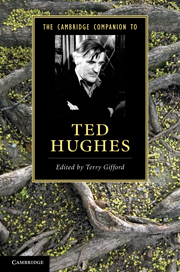Book contents
- Frontmatter
- Contents
- Acknowledgements
- Contributors
- Note on Referencing and Abbreviations
- Chronology
- Introduction
- 1 The problem of biography
- 2 The debates about Hughes
- 3 Hughes and animals
- 4 Ted Hughes and Sylvia Plath
- 5 The anthropologist’s uses of myth
- 6 Hughes’s social ecology
- 7 Hughes and feminism
- 8 Hughes and the classics
- 9 Hughes as prose writer
- 10 Hughes on Shakespeare
- 11 Class, war and the Laureateship
- 12 Hughes and his critics
- Guide to further reading
- Index
11 - Class, war and the Laureateship
Published online by Cambridge University Press: 28 July 2011
- Frontmatter
- Contents
- Acknowledgements
- Contributors
- Note on Referencing and Abbreviations
- Chronology
- Introduction
- 1 The problem of biography
- 2 The debates about Hughes
- 3 Hughes and animals
- 4 Ted Hughes and Sylvia Plath
- 5 The anthropologist’s uses of myth
- 6 Hughes’s social ecology
- 7 Hughes and feminism
- 8 Hughes and the classics
- 9 Hughes as prose writer
- 10 Hughes on Shakespeare
- 11 Class, war and the Laureateship
- 12 Hughes and his critics
- Guide to further reading
- Index
Summary
Hughes nailed his flag to the mast of the establishment when he became Poet Laureate, not just by accepting the post, but by reviving its most archaic and despised function, the celebration of royal birthdays, which had lapsed in the early nineteenth century. He joined the line of Shadwell, Cibber and Southey in being derided by other poets for his loyal efforts, and for his relations with members of the Royal Family. Reviewing Rain-Charm for the Duchy and Other Laureate Poems for the Sunday Times, Peter Reading described most of the poems as ‘clumsily contrived, cringingly sycophantic hack-work’, and speculated that ‘the poet laureate has been superseded by the court jester’. Becoming Laureate coincided with, and may have contributed to, a decline in Hughes’s critical reputation. Yet he probably took his royal verses more seriously than any of his mediocre eighteenth-century predecessors. He was a lifelong monarchist and, while still at university, had composed a dialogue between Elizabeth I and Elizabeth II, in which the former scorns the latter’s reduced role, saying,
A king is the symbol of control over a nation which quite effectively does keep them in some sort of harmonic subjection and discipline, which is the only mood in which they can be happy or efficient. Under a leader every individual becomes a more disciplined cohesive unit in the national purpose . . . Over centuries man’s mind has accustomed itself under the image of a King, the passionately contemplated image of a national leader, to assemble and invoke all its deepest powers.
- Type
- Chapter
- Information
- The Cambridge Companion to Ted Hughes , pp. 150 - 161Publisher: Cambridge University PressPrint publication year: 2011



